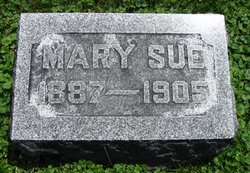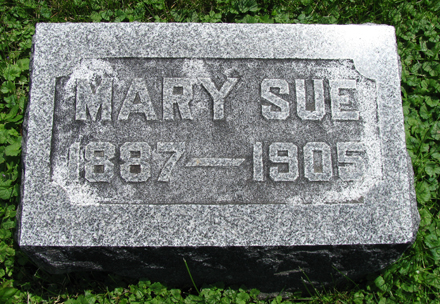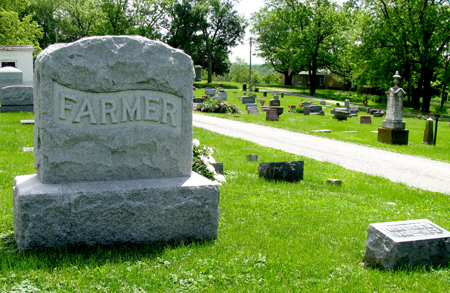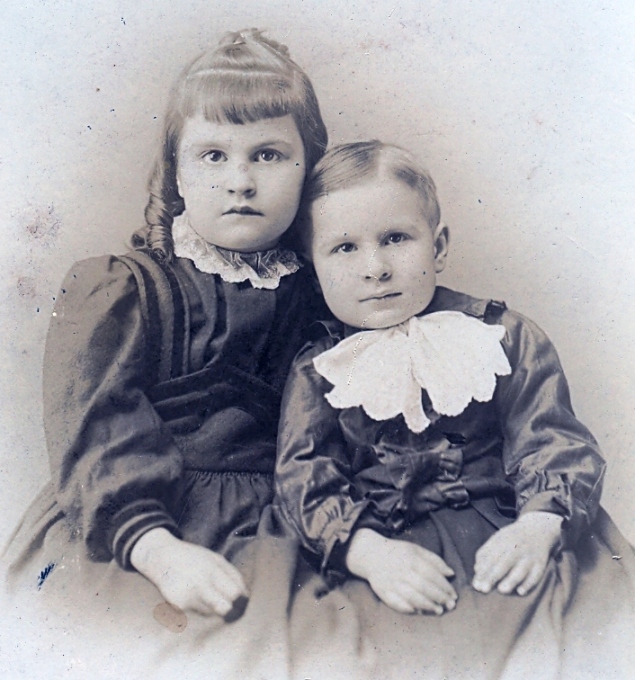The hand of Death has invaded our College home and plucked one of its fairest flowers, Mary Sue Farmer, Friday evening. A life on the very borderland of noble womanhood was and is no more. A chair in the chapel is vacant; a society hall is draped in mourning. A daughter of the College has passed from the circle here below to widen the circle of those who have gone before. These years of College life and companionship, how dear they are. Could we not have been spared such sorrow for this little period of time? But the morning sky has its clouds as well as its sunshine. But a short time ago the nuptial torches were burning for some of our College family, and we were called upon to rejoice with those who were rejoicing. Now we must weep with those who weep. And what consolation have we? That disease and not sin had blighted the life of this fair one. She was not too young to die. But O, she was not too young to live! A half blown rose has fallen from the bush and lies withered; but its fragrance and beauty can never leave our minds. A promised life has been cut off and the dust returned to the earth from whence it sprung; but the spirit is with God who gave it, and a blessed memory remains with us.
Memorial services were conducted at the College Tuesday morning in which the faculty and students took part. Robert Painter spoke for the Shakespearean Society and J.W. Callaway for the Philomathean Society, which remarks are given below:
"We have come as a society to mourn with a sister society, the death of one of its esteemed members. For in this death, we feel a share of the loss which has been sustained by the school. The decease of a leading citizen may deprive a community of a benefactor, but of one whose life had borne its fruit. The decease of one in the bloom of youth is the plucking of a flower whose fruit was yet to come. So was it with her in whose memory we have met. But though she was not permitted to remain and fulfill the life of usefulness of which she had given promise, her presence with us during her brief stay was beneficial. In this imperfect world the influence of one life may bless or curse beyond all comprehension. In the little world in which she moved what possibilities of uplifting or degrading? And who among us can say that her life, though short, was entirely fruitless, or that its fruit was evil. We of the Shakespearean Institute who have sat with her in the classroom, who have journeyed side by side with her over the rough ways toward the goal which she will never reach, shall miss the encouragement of a fellow traveler. The society to which she belonged, for whose advancement she labored so untiringly, will miss her from her accustomed place. But most of all from our school family, whose circle has been broken, will she be missed. A life of purity and high ideals, an earnest, unselfish, Christian life has ceased to impart its daily blessing to our lives. What tribute can we render? Words are but vain; flowers but fading tokens. Within our hearts is eroded the most fitting monument heartfelt sorrow for the loss of one whose life had touched our lives, and whose influence had been for good and not for evil."
I know how vain it is to gild a grief like this with words, language cannot express the emotions of the heart. Death has been made fearful, stained and polluted by superstitious awe, but to know Christ is to know that.
"There is no death; the stars go down
To rise upon some fairer shore
And bright in heaven's jeweled crown
They forevermore.
There is no death; but angel forms
Walk o'er the earth with silent tread;
They bear our best loved things away
And then we call them dead."
I know that I express the sentiment of every member of the Philomathean society when I say that when death touched the heart of Miss Farmer it cast its somber shadow on our own. Miss Farmer was called from our fellowship in the springtime of life, just in that season when the song birds are never silent in the bosom and the poetry of nature seems more intense. Her face was still toward the rising sun and the pure dews of youth had not yet been absorbed by the meridian sum of life, but there is nothing uncommon in this; for from the tree of life the immature falls with the ripened fruit and in the common bed of earth patriarch and babe lie sleeping side by side. Whether Miss Farmer was present at another roll call than ours this morning we do not know; whether her faculties which were being disciplined here are now being trained in a loftier school than ours we do not know; whether the sun which set for her on last Friday evening rose in a fairer and celestial realm than ours we do not know, by any knowledge of which this world is heir, we can only hope and trust. Last evening as I stood near the river bank looking toward the west a curtain of cloud like a silver sheen hung behind the cross on the catholic church and as the setting sun poured its rays thro' it, the cross seemed to glow with a rare splendor all its own. I thought as I looked upon that scene of her Christian faith, the fortitude with which she met death and realized that though the sun of her life had set before it had hardly tinged the horizon, it went down amid the prophetic splendors of an eternal dawn. The ineffable glory of a Christian life.
OBITUARY: LaGrange Weekly Indicator, LaGrange, Missouri,
May 4, 1905
IN MEMORIAM
"Of all the thoughts of God that are
Borne inward into souls afar,
Along the Psalmist's music deep
Now tell if that any is
For gift or grace surpassing this
He giveth His beloved sleep."
Mary Sue Farmer was born in LaGrange, Mo., April 10, 1887. In her early childhood her parents removed to Monticello, where she remained until some six years ago, when she returned to our midst to help us with the inspiration of her presence. After her graduation from the High School, she continued her course of study in LaGrange College, being a member of the class of nineteen hundred and six. In the very midst of her work the summons came and she was called above to learn where truth is no longer seen as through a glass darkly but face to face. After three short weeks of illness, weeks filled with anxiety to family and friends, on the evening of the twenty-eighth of April, her life's sun set in calm serenity. There was no moaning of the bar when she put out to sea.
"But such a tide as moving seems asleep
Too full for sound or foam,
From that which drew from out the boundless deep
Turns again home."
Her Christian hope lit up the pathway of a glorious immortality. Her hands have rested from their labors here, a greater, nobler task awaits beyond.
In the spring of life, which promised so much for the future, she left us, left us to mourn in sorrow's sad reflective silence because we felt that the cherished presence of a power for time and noble living had vanished from our lives. Few were her years among us, yet in depths of sympathy and feeling she has marked deeply rather than widely, and those who knew her best will sorrow most at her departure. Her life has been an inspiration toward the highest type of Christian living; her death is another link binding us to heaven.
It is with tears, then, not with fears, that we call to remembrance our sleeping friend. Her departure has not brought gloom and night into our lives, but a silver gray of thoughtfulness, an indefinable feeling that something vital has been taken from us and a longing that can be satisfied only by the meeting beyond the river. The woods, the grassy vales, and all nature in which she found her greatest joy, will murmur a soft requiem for her whose feet will never tread again those sacred paths among classroom and church, and her home will keenly feel the burden of her absence, and everywhere find vacancies which never can be filled. The lovely flower has withered, yet its fragrance still clings around the vase; the silver cord is loosed, and yet forever will its music sound upon our ears; the fragile house of life is shattered, still lives the soul forever mingled with our own. In each heart will be a niche filled with the holy incense of remembrance, rising forever to purify our thoughts and lives.
A Friend
The hand of Death has invaded our College home and plucked one of its fairest flowers, Mary Sue Farmer, Friday evening. A life on the very borderland of noble womanhood was and is no more. A chair in the chapel is vacant; a society hall is draped in mourning. A daughter of the College has passed from the circle here below to widen the circle of those who have gone before. These years of College life and companionship, how dear they are. Could we not have been spared such sorrow for this little period of time? But the morning sky has its clouds as well as its sunshine. But a short time ago the nuptial torches were burning for some of our College family, and we were called upon to rejoice with those who were rejoicing. Now we must weep with those who weep. And what consolation have we? That disease and not sin had blighted the life of this fair one. She was not too young to die. But O, she was not too young to live! A half blown rose has fallen from the bush and lies withered; but its fragrance and beauty can never leave our minds. A promised life has been cut off and the dust returned to the earth from whence it sprung; but the spirit is with God who gave it, and a blessed memory remains with us.
Memorial services were conducted at the College Tuesday morning in which the faculty and students took part. Robert Painter spoke for the Shakespearean Society and J.W. Callaway for the Philomathean Society, which remarks are given below:
"We have come as a society to mourn with a sister society, the death of one of its esteemed members. For in this death, we feel a share of the loss which has been sustained by the school. The decease of a leading citizen may deprive a community of a benefactor, but of one whose life had borne its fruit. The decease of one in the bloom of youth is the plucking of a flower whose fruit was yet to come. So was it with her in whose memory we have met. But though she was not permitted to remain and fulfill the life of usefulness of which she had given promise, her presence with us during her brief stay was beneficial. In this imperfect world the influence of one life may bless or curse beyond all comprehension. In the little world in which she moved what possibilities of uplifting or degrading? And who among us can say that her life, though short, was entirely fruitless, or that its fruit was evil. We of the Shakespearean Institute who have sat with her in the classroom, who have journeyed side by side with her over the rough ways toward the goal which she will never reach, shall miss the encouragement of a fellow traveler. The society to which she belonged, for whose advancement she labored so untiringly, will miss her from her accustomed place. But most of all from our school family, whose circle has been broken, will she be missed. A life of purity and high ideals, an earnest, unselfish, Christian life has ceased to impart its daily blessing to our lives. What tribute can we render? Words are but vain; flowers but fading tokens. Within our hearts is eroded the most fitting monument heartfelt sorrow for the loss of one whose life had touched our lives, and whose influence had been for good and not for evil."
I know how vain it is to gild a grief like this with words, language cannot express the emotions of the heart. Death has been made fearful, stained and polluted by superstitious awe, but to know Christ is to know that.
"There is no death; the stars go down
To rise upon some fairer shore
And bright in heaven's jeweled crown
They forevermore.
There is no death; but angel forms
Walk o'er the earth with silent tread;
They bear our best loved things away
And then we call them dead."
I know that I express the sentiment of every member of the Philomathean society when I say that when death touched the heart of Miss Farmer it cast its somber shadow on our own. Miss Farmer was called from our fellowship in the springtime of life, just in that season when the song birds are never silent in the bosom and the poetry of nature seems more intense. Her face was still toward the rising sun and the pure dews of youth had not yet been absorbed by the meridian sum of life, but there is nothing uncommon in this; for from the tree of life the immature falls with the ripened fruit and in the common bed of earth patriarch and babe lie sleeping side by side. Whether Miss Farmer was present at another roll call than ours this morning we do not know; whether her faculties which were being disciplined here are now being trained in a loftier school than ours we do not know; whether the sun which set for her on last Friday evening rose in a fairer and celestial realm than ours we do not know, by any knowledge of which this world is heir, we can only hope and trust. Last evening as I stood near the river bank looking toward the west a curtain of cloud like a silver sheen hung behind the cross on the catholic church and as the setting sun poured its rays thro' it, the cross seemed to glow with a rare splendor all its own. I thought as I looked upon that scene of her Christian faith, the fortitude with which she met death and realized that though the sun of her life had set before it had hardly tinged the horizon, it went down amid the prophetic splendors of an eternal dawn. The ineffable glory of a Christian life.
OBITUARY: LaGrange Weekly Indicator, LaGrange, Missouri,
May 4, 1905
IN MEMORIAM
"Of all the thoughts of God that are
Borne inward into souls afar,
Along the Psalmist's music deep
Now tell if that any is
For gift or grace surpassing this
He giveth His beloved sleep."
Mary Sue Farmer was born in LaGrange, Mo., April 10, 1887. In her early childhood her parents removed to Monticello, where she remained until some six years ago, when she returned to our midst to help us with the inspiration of her presence. After her graduation from the High School, she continued her course of study in LaGrange College, being a member of the class of nineteen hundred and six. In the very midst of her work the summons came and she was called above to learn where truth is no longer seen as through a glass darkly but face to face. After three short weeks of illness, weeks filled with anxiety to family and friends, on the evening of the twenty-eighth of April, her life's sun set in calm serenity. There was no moaning of the bar when she put out to sea.
"But such a tide as moving seems asleep
Too full for sound or foam,
From that which drew from out the boundless deep
Turns again home."
Her Christian hope lit up the pathway of a glorious immortality. Her hands have rested from their labors here, a greater, nobler task awaits beyond.
In the spring of life, which promised so much for the future, she left us, left us to mourn in sorrow's sad reflective silence because we felt that the cherished presence of a power for time and noble living had vanished from our lives. Few were her years among us, yet in depths of sympathy and feeling she has marked deeply rather than widely, and those who knew her best will sorrow most at her departure. Her life has been an inspiration toward the highest type of Christian living; her death is another link binding us to heaven.
It is with tears, then, not with fears, that we call to remembrance our sleeping friend. Her departure has not brought gloom and night into our lives, but a silver gray of thoughtfulness, an indefinable feeling that something vital has been taken from us and a longing that can be satisfied only by the meeting beyond the river. The woods, the grassy vales, and all nature in which she found her greatest joy, will murmur a soft requiem for her whose feet will never tread again those sacred paths among classroom and church, and her home will keenly feel the burden of her absence, and everywhere find vacancies which never can be filled. The lovely flower has withered, yet its fragrance still clings around the vase; the silver cord is loosed, and yet forever will its music sound upon our ears; the fragile house of life is shattered, still lives the soul forever mingled with our own. In each heart will be a niche filled with the holy incense of remembrance, rising forever to purify our thoughts and lives.
A Friend
Family Members
Sponsored by Ancestry
Advertisement
Advertisement









